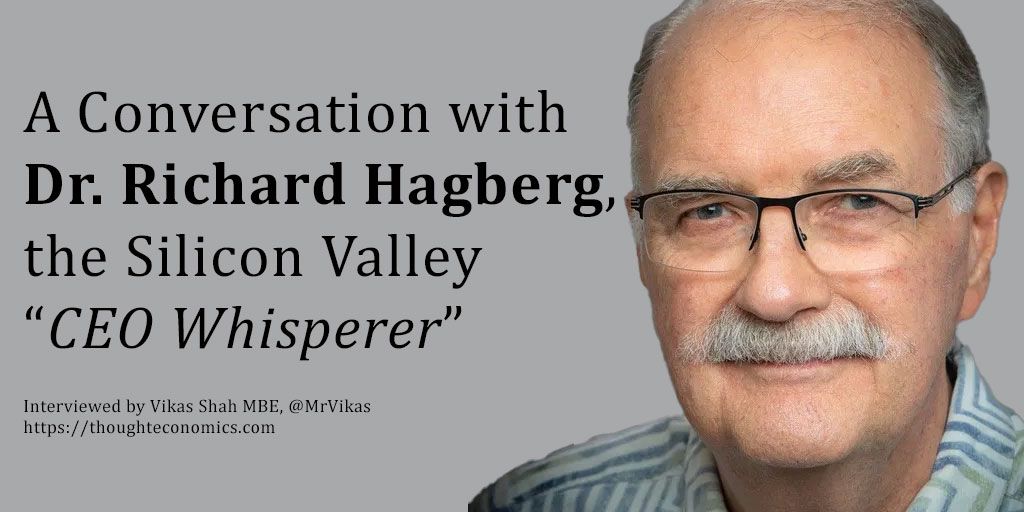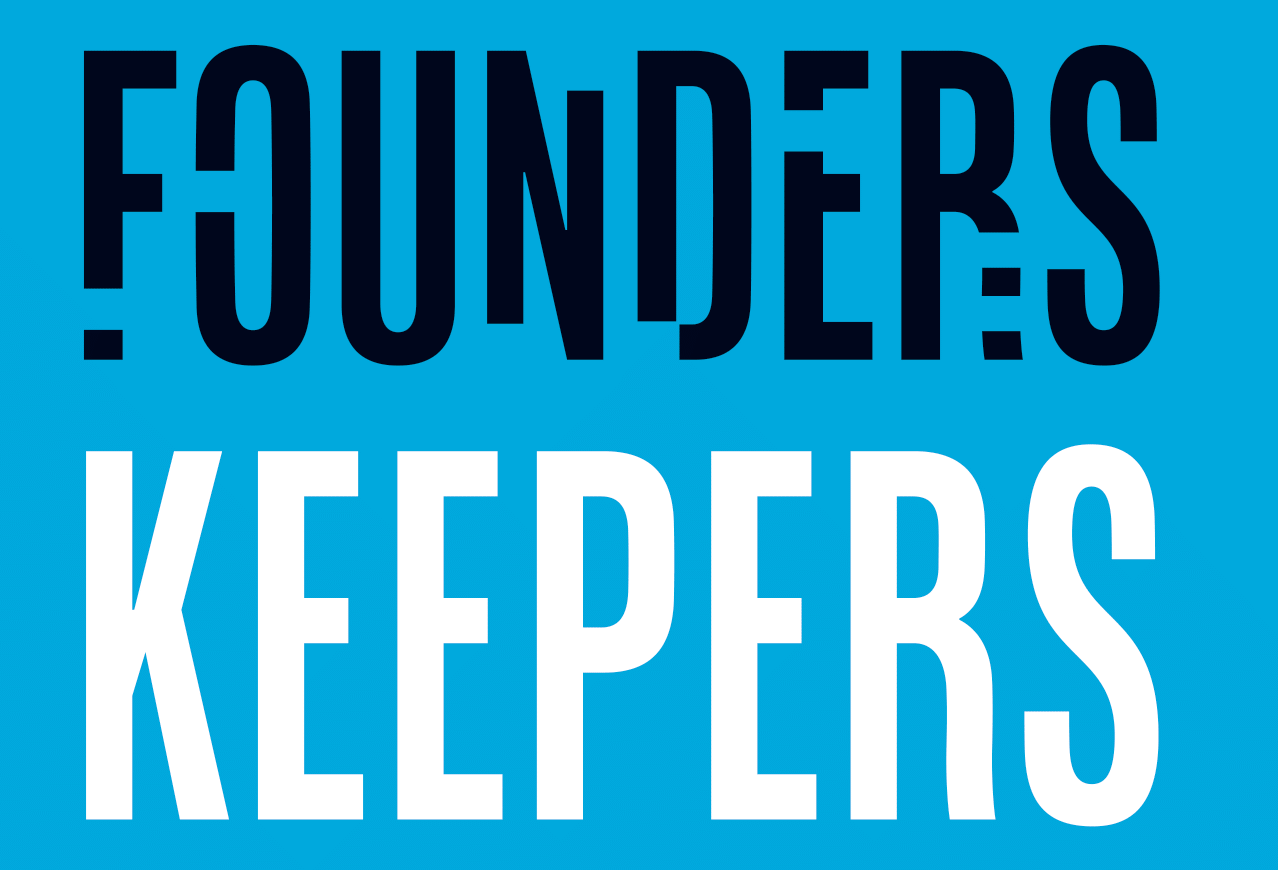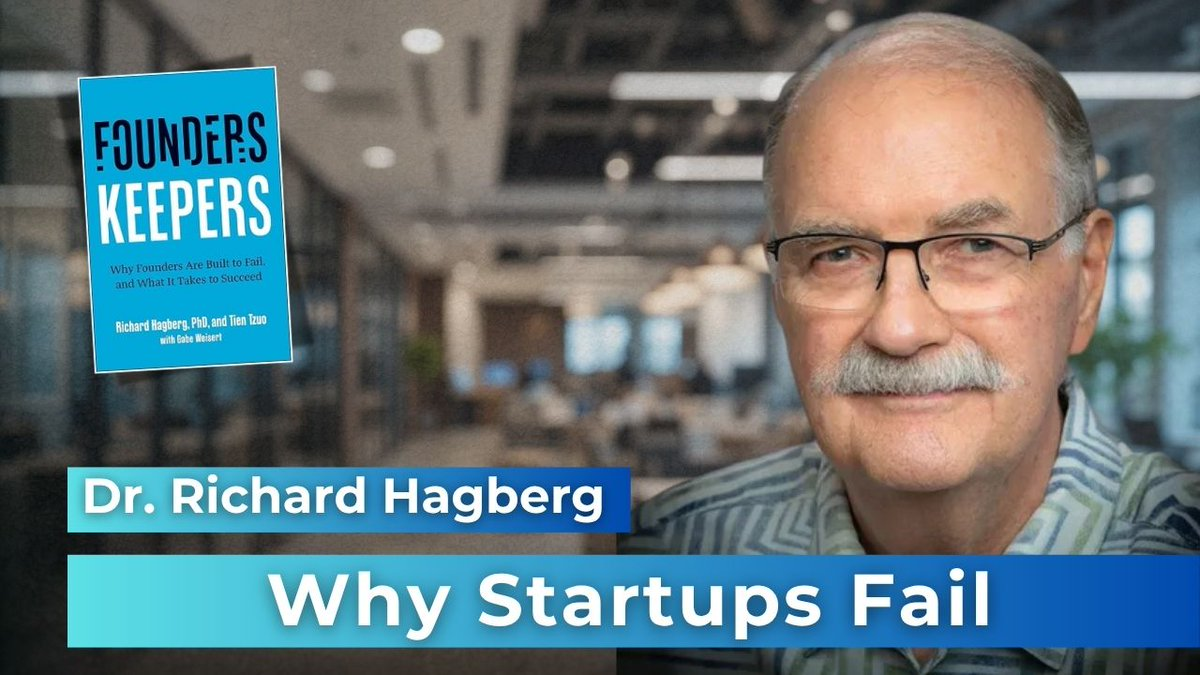Article
A Conversation with Dr. Richard Hagberg, the Silicon Valley "CEO Whisperer"

In this interview I speak to Rich Hagberg, Ph.D., often referred to as “Silicon Valley’s CEO Whisperer.” Richard is a trained psychologist who has spent the last 40 years of his career as an executive management coach for over 6,000 executives. Since 2009 he has worked with companies like Tinder, Twitter, Dropbox, MixPanel, Zendesk, Quora, Asana, Pinterest, Salesforce, Munchery, Reddit, Gusto, Cruise, Tinder, Optimizely, Instacart, Patreon, Nerdwallet, and Super Evil Megacorp (it’s a gaming company). He is the co-author of Founders Keepers, Why Founders are Built to Fail & What it Takes to Succeed.
Q: What do you mean, when you say all founders are built to fail?
[Richard Hagberg]: I think that by saying founders are built to get the rocket off the ground, what we’re really acknowledging is that many of them never get it into orbit. Fewer still get it to the moon, and almost none make it to Mars. The problem is execution. Founders are idea people — driven, persistent, individualistic loners and contrarians. It’s hard for them to adapt because they have strong views. It’s hard for them to work through others because they’re independent and used to getting their way. So they don’t delegate and they over-control. They see structure and systems as bureaucracy. They often lack self-awareness — of how they impact others, what they’re good at, and what they’re not. And a lot of them just can’t handle the stress. I mean, people ask me, “Should I do a startup?” And I say, “Well, how important is work-life balance to you?” And if they say anything other than “It’s not important,” I say, “You shouldn’t do it.” Because it’s a killing field. So basically, let me summarise that by saying: the skills that get them to one point won’t carry them the rest of the way. We talk about the ticking time bomb. The ticking time bomb is these very characteristics — when you’re trying to scale, and things are getting more complex, and you have to work through other people — they blow up.
Q: Why do we still believe in the genius jerk archetype?
[Richard Hagberg]: I was just writing something on this earlier in the week. I was looking at examples like Steve Jobs — before he got fired, he was a genius jerk. He got fired, started NeXT Computer, and it didn’t take off. Then he got involved with Pixar, and apparently one of the Pixar co-founders helped him understand the importance of empathy. So when he came back to Apple, he was more willing to adapt, to work through others — with people like Jony Ive, Tim Cook, and others. He was never a choir boy or a saint. The same thing applied to Gates. In the early days of Microsoft, Gates was a terror. But after around 2000, he mellowed a lot. Even Bezos — I mean, around the time that book came out trashing Amazon’s culture, Covid was hitting, his people were under incredible stress, and he was getting all kinds of feedback. So there are these transformational moments that often change people. But look, there are a variety of reasons why founders get misled. Successful, abusive, aggressive people are highly visible — we think of Elon Musk as a good example — and we dramatize these figures. We looked at 122 founders and compared them from the perspective of multiple invested capital, and the most successful ones didn’t fall into that category. They weren’t choirboys, but they didn’t fall into the same patterns either.
Q: How can we encourage founders to be more self aware?
[Richard Hagberg]: …you’ve got to create a psychologically safe environment where people on your team feel able to give you feedback. If they feel intimidated, they’re not going to tell the emperor — or empress — that they have no clothes. So that’s the first thing. The second is, it’s helpful to get objective heat back. These people listen to data. When I came to Silicon Valley, 360s had just started, and I used to give talks about how important a tool it was — because the engineers I was coaching listened to data. Whether it’s 360 feedback, an objective engagement survey, or an employee survey, it helps them understand their impact and what’s really going on in the organization. Having good coaches and mentors who will tell truth to power — that’s the business I’m in. I’m in the business of telling truth to power. And there are two things. One is that unless you learn and grow continuously, you’re probably going to end up as one of the 90% who don’t make it. The second is — and I mean, I’m a serial entrepreneur as well as a psychologist — thank God I learned to meditate when I was 19. That gives me a bit of distance from my behaviour. It lets me observe things with more clarity. And because startups are so stressful — such a killing field — it undermines decision quality and brings out bad behavior. My Master’s thesis back in the ’70s was on meditation; my doctoral thesis was on stress and its impact on people. There’s been plenty of research since then that’s validated it, and I see it all the time. When these people are under stress, they make bad decisions. They get reactive. One of the key findings in our conclusions is that the unsuccessful founders were more reactive. They weren’t measured. They weren’t deliberate. They didn’t make decisions based on facts — their emotions carried them away.
I’ve got to tell you a story. When I went back to graduate school, one of my mentors called me into his office and said, “Rich, there’s one little piece of advice I’d like to give you.” And I thought, oh boy, here it comes. Then he said, “Rich, sometimes you treat a wisp of intuition as though it were a four-lane highway.” It’s not that you shouldn’t trust intuition — it’s that you need to validate it. And to validate it, you have to run a decision-making process that’s grounded in facts, built around having multiple alternatives, and involves actively seeking those alternatives from other people. And then — because everyone is biased, and the research on cognitive bias is very compelling — you have to run a disciplined process to ensure the facts and alternatives actually surface.
Q: What about the effectiveness of the boards around these founders?
[Richard Hagberg]: I’ve talked to board members at companies where the leader was pushed out for unethical behavior or ended up indicted. It often comes down to the fact that they waited too long — guided by greed — to address dysfunctional behavior that could sink the company later. That’s the first thing. The second is that many boards today, especially startup boards, are dominated by investors who don’t have operating experience. So they try to hold people accountable, but only for the numbers — not for their behavior, and not for their actions as leaders. Another thing I see is that because the board is more challenging than supportive, it ends up encouraging founders to exaggerate, to bend the truth, and to feel unsafe being honest about the problems — which means the board can’t actually help. And a lot of investors aren’t able to help anyway — they can’t give the kind of strategic support that’s really needed. Founders want help with strategy, but they want that help from people who’ve been there and done it — people with real operating experience.
Q: What is the role of the coach, or mentor, in the founders’ journey?
[Richard Hagberg]: In my mind, there’s a difference between being a coach and being a mentor. I’m a psychologist, but I’ve also been a founder, and I’ve been studying leadership since 1986. So at times, I’m using the psychologist’s lens to peel the onion — to understand what’s going on inside and where they’re blocked. At other times, it’s clear that a lot of them lack best-practice experience. They’ve never had a boss, they’ve never been a boss, and they don’t know how accountability works. They have no models, no frameworks. That’s where mentors can help — with frameworks. But if the mentor is only drawing on their own experience scaling their company, it might not translate. It could be a totally different kind of company with a completely different business model. Those mentors are great at offering advice on what worked for them — but they’re not always as helpful in answering questions like: what do we know about how to make good decisions, or how to build effective teams?
Q: How do founders avoid burnout?
[Richard Hagberg]: I think you have to make your own physical and mental health a real priority if you’re going to make it through. When you take a step back and look at what we learned in the book, it’s essentially survival of the fittest. And fitness means not resorting to things like alcohol and drugs to cope with stress — which so many people do — and making sure you get enough exercise and enough sleep. People are proud of how many hours they work — it’s almost like a badge. And it’s crazy, because I can see how it undermines both their judgement and their health. I’ve probably been burnt out three times over the years and had to do a reset. And each time, I’ve had to ask: what am I doing that’s pushing me over the edge here? Where can I set boundaries?
And if you’re too demanding — if you only focus on results, put constant pressure on people, and make it unsafe for them to push back — you’ll burn out your team. I have a client right now who’s been pushing hard to hit financial goals, and multiple members of the senior management team have thrown in the towel. They’ve said, “That’s it, I can’t deal with this, it’s destroying me.”
What’s interesting — and this is something we haven’t talked about — is that the successful founders don’t necessarily have high emotional intelligence, but they have better emotional intelligence than the unsuccessful ones. And that allows them to read people, to check in on their wellbeing, to ask what’s getting in the way of performance. The unsuccessful ones have no empathy — they just drive people. They treat relationships as transactions. For them, it’s all about tasks, not about people. But it’s not a machine.
Q: Do you see a relationship between neurodiversity and the most successful founders you have worked with?
[Richard Hagberg]: I’m not an expert on the spectrum — but I suspect that people who get caught up in their internal world of ideas, and aren’t aware of people, emotion, team dynamics, and all that, who are just purely idea people — it really gets in the way. That said, I know one very successful founder who’s clearly Asperger’s, and he’s made a real effort to learn how to be a leader. It doesn’t come naturally to him — it’s not instinctive — but he works at it.
People often ask, in a whisper, “Do people really change?” And I say, look, people may not change their fundamental personality, but they can change their behaviour. That said, how much they can change is limited. And when people ask how much, I say, well, on a 10-point scale, if you really work at it, you can probably move about 3 points. So if a job requires you to be at an 8, and you’re a 4, it’s going to be tough.
And that’s where execution becomes a problem for many founders. Because founders are creative, idea-driven people. The insights they get, their willingness to challenge tradition, and their awareness of the market — that’s what fuels them early on. They’re divergent thinkers. They generate possibilities. But at a certain stage — when the company enters the traction or fast-growth phase — you need to bring focus to the organisation. And they get distracted by shiny objects. Any new idea just sweeps them away.
Q: What is the relationship of wealth to the journey of your founders?
[Richard Hagberg]: it’s something I tell my clients — especially when I’m assessing whether I’ll work with someone. I ask, “What’s your goal? What’s your vision?” And if they say, “I want to grow a million-dollar company,” or, “I want to do an IPO,” I say, “No, but what’s your vision?” I know a venture capitalist who says when someone gives that kind of answer, it’s an immediate knockout.
My belief isn’t that greed doesn’t exist — it does — but when it’s the primary driver, and there’s no passion for doing something meaningful or making an impact, they’re much less likely to make it through the tough times. You need to be willing to hit the wall, and hit the wall, and hit the wall — again and again.
If you’re curing cancer, you’ll be willing to hang in there. Or if you believe you’re building a technology that could change the world — like AI — then you’re less likely to give up, and more likely to understand that people aren’t just cogs in the machine.
Q: What does legacy mean to you?
[Richard Hagberg]: I’ll answer that by telling you a story. One of my clients worked for a big international pharmaceutical company. He wasn’t a founder. He wanted me to attend a meeting he was facilitating so I could observe him. I got to the meeting, and a guy sat next to me. The tables were arranged in a U, and he was sitting right beside me. I noticed he was staring at me. I turned and said hello, and he said, “You don’t remember me.” I said, “Help me out — remind me.”
He said, “Well, 10 years ago we worked together.” And all of a sudden, I realised who he was. He had grey hair now — I remembered him when he didn’t — and I said, “Oh yeah!” Then he said, “You changed my life.” I said, “I did?” And he said, “Yeah.” I asked, “What did I do? What did I say?”
He said it was just one thing. He wasn’t an assertive guy. He told me, “You said I didn’t have the right to always get what I want, but I did have the right to be heard.” And I was like, “Okay.”
I’ve heard stories like that a lot. Sometimes they don’t remember it the same way I do, but you never know what you might say or do that changes a single individual — and that person may go on to do something really significant.
When I was in college, I was an idealist. I was a protestor and all that. And now, my goal is to help people make change. I help my clients unpack the problems and challenges they’re facing — and hopefully, that makes a difference.
About the Author
Vikas Shah MBE DL is an entrepreneur, investor & philanthropist. He is CEO of Swiscot Group alongside being a venture-investor in a number of businesses internationally. He is a Non-Executive Board Member of the UK Government’s Department for Business, Energy & Industrial Strategy and a Non-Executive Director of the Solicitors Regulation Authority. Vikas was awarded an MBE for Services to Business and the Economy in Her Majesty the Queen’s 2018 New Year’s Honours List and in 2021 became a Deputy Lieutenant of the Greater Manchester Lieutenancy. He is an Honorary Professor of Business at The Alliance Business School, University of Manchester and Visiting Professors at the MIT Sloan Lisbon MBA.
share this
Related Articles
Related Articles

STAY UP TO DATE
GET PATH'S LATEST
Receive bi-weekly updates from the church, and get a heads up on upcoming events.
Contact Us










